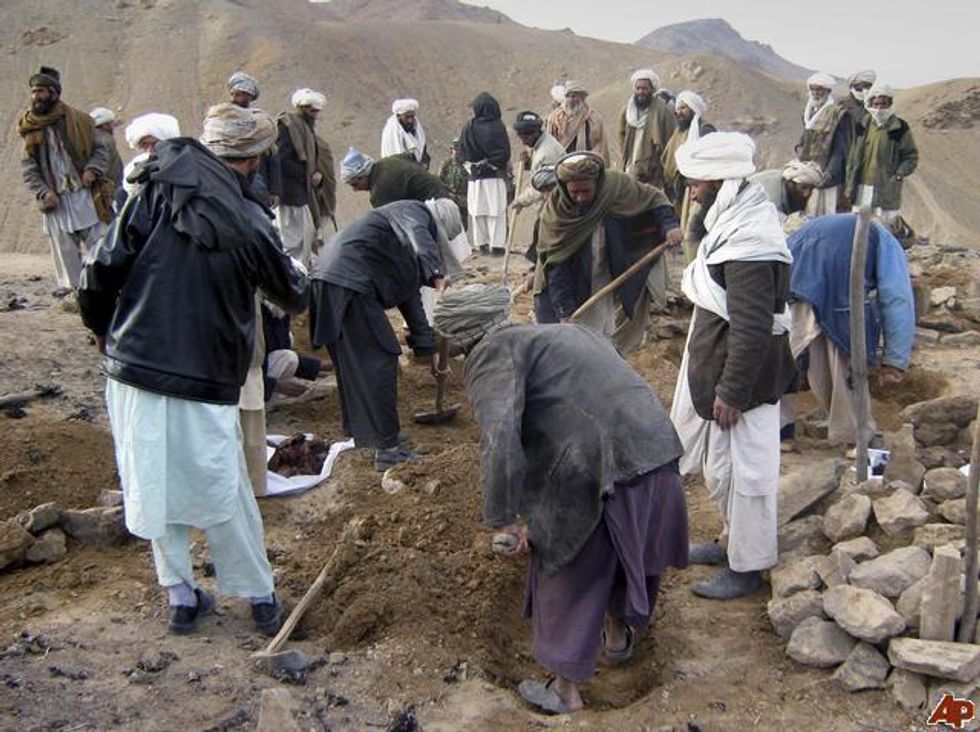US Attack Kills 5 Afghan Kids
The way in which the U.S. media ignores such events speaks volumes about how we perceive them
Yesterday, I noted several reports from Afghanistan that as many as 20 civilians were killed by two NATO airstrikes, including a mother and her five children. Today, the U.S. confirmed at least some of those claims, acknowledging and apologizing for its responsibility for the death of that family:

The American military claimed responsibility and expressed regret for an airstrike that mistakenly killed six members of a family in southwestern Afghanistan, Afghan and American military officials confirmed Monday.
The attack, which took place Friday night, was first revealed by the governor of Helmand Province, Muhammad Gulab Mangal, on Monday. His spokesman, Dawoud Ahmadi, said that after an investigation they had determined that a family home in the Sangin district had been attacked by mistake in the American airstrike, which was called in to respond to a Taliban attack. . . . The victims were the family's mother and five of her children, three girls and two boys, according to Afghan officials.
This happens over and over and over again, and there are several points worth making here beyond the obvious horror:
"You can't just spend year after year piling up the corpses of children and credibly insist that it has no bearing on who you are. That's particularly true when, as is the case in Afghanistan, the cause of the war is so vague as to be virtually unknowable."
(1) To the extent these type of incidents are discussed at all -- and in American establishment media venues, they are most typically ignored -- there are certain unbending rules that must be observed in order to retain Seriousness credentials. No matter how many times the U.S. kills innocent people in the world, it never reflects on our national character or that of our leaders. Indeed, none of these incidents convey any meaning at all. They are mere accidents, quasi-acts of nature which contain no moral information (in fact, the NYT article on these civilian deaths, out of nowhere, weirdly mentioned that "in northern Afghanistan, 23 members of a wedding celebration drowned in severe flash flooding" -- as though that's comparable to the U.S.'s dropping bombs on innocent people). We've all been trained, like good little soldiers, that the phrase "collateral damage" cleanses and justifies this and washes it all way: yes, it's quite terrible, but innocent people die in wars; that's just how it is. It's all grounded in America's central religious belief that the country has the right to commit violence anywhere in the world, at any time, for any cause.
At some point -- and more than a decade would certainly qualify -- the act of continuously killing innocent people, countless children, in the Muslim world most certainly does reflect upon, and even alters, the moral character of a country, especially its leaders. You can't just spend year after year piling up the corpses of children and credibly insist that it has no bearing on who you are. That's particularly true when, as is the case in Afghanistan, the cause of the war is so vague as to be virtually unknowable. It's woefully inadequate to reflexively dismiss every one of these incidents as the regrettable but meaningless by-product of our national prerogative. But to maintain mainstream credibility, that is exactly how one must speak of our national actions even in these most egregious cases. To suggest any moral culpability, or to argue that continuously killing children in a country we're occupying is morally indefensible, is a self-marginalizing act, whereby one reveals oneself to be a shrill and unSerious critic, probably even a pacifist. Serious commentators, by definition, recognize and accept that this is merely the inevitable outcome of America's supreme imperial right, note (at most) some passing regret, and then move on.
Read the full article and updates at Salon.com
An Urgent Message From Our Co-Founder
Dear Common Dreams reader, The U.S. is on a fast track to authoritarianism like nothing I've ever seen. Meanwhile, corporate news outlets are utterly capitulating to Trump, twisting their coverage to avoid drawing his ire while lining up to stuff cash in his pockets. That's why I believe that Common Dreams is doing the best and most consequential reporting that we've ever done. Our small but mighty team is a progressive reporting powerhouse, covering the news every day that the corporate media never will. Our mission has always been simple: To inform. To inspire. And to ignite change for the common good. Now here's the key piece that I want all our readers to understand: None of this would be possible without your financial support. That's not just some fundraising cliche. It's the absolute and literal truth. We don't accept corporate advertising and never will. We don't have a paywall because we don't think people should be blocked from critical news based on their ability to pay. Everything we do is funded by the donations of readers like you. Will you donate now to help power the nonprofit, independent reporting of Common Dreams? Thank you for being a vital member of our community. Together, we can keep independent journalism alive when it’s needed most. - Craig Brown, Co-founder |
Yesterday, I noted several reports from Afghanistan that as many as 20 civilians were killed by two NATO airstrikes, including a mother and her five children. Today, the U.S. confirmed at least some of those claims, acknowledging and apologizing for its responsibility for the death of that family:

The American military claimed responsibility and expressed regret for an airstrike that mistakenly killed six members of a family in southwestern Afghanistan, Afghan and American military officials confirmed Monday.
The attack, which took place Friday night, was first revealed by the governor of Helmand Province, Muhammad Gulab Mangal, on Monday. His spokesman, Dawoud Ahmadi, said that after an investigation they had determined that a family home in the Sangin district had been attacked by mistake in the American airstrike, which was called in to respond to a Taliban attack. . . . The victims were the family's mother and five of her children, three girls and two boys, according to Afghan officials.
This happens over and over and over again, and there are several points worth making here beyond the obvious horror:
"You can't just spend year after year piling up the corpses of children and credibly insist that it has no bearing on who you are. That's particularly true when, as is the case in Afghanistan, the cause of the war is so vague as to be virtually unknowable."
(1) To the extent these type of incidents are discussed at all -- and in American establishment media venues, they are most typically ignored -- there are certain unbending rules that must be observed in order to retain Seriousness credentials. No matter how many times the U.S. kills innocent people in the world, it never reflects on our national character or that of our leaders. Indeed, none of these incidents convey any meaning at all. They are mere accidents, quasi-acts of nature which contain no moral information (in fact, the NYT article on these civilian deaths, out of nowhere, weirdly mentioned that "in northern Afghanistan, 23 members of a wedding celebration drowned in severe flash flooding" -- as though that's comparable to the U.S.'s dropping bombs on innocent people). We've all been trained, like good little soldiers, that the phrase "collateral damage" cleanses and justifies this and washes it all way: yes, it's quite terrible, but innocent people die in wars; that's just how it is. It's all grounded in America's central religious belief that the country has the right to commit violence anywhere in the world, at any time, for any cause.
At some point -- and more than a decade would certainly qualify -- the act of continuously killing innocent people, countless children, in the Muslim world most certainly does reflect upon, and even alters, the moral character of a country, especially its leaders. You can't just spend year after year piling up the corpses of children and credibly insist that it has no bearing on who you are. That's particularly true when, as is the case in Afghanistan, the cause of the war is so vague as to be virtually unknowable. It's woefully inadequate to reflexively dismiss every one of these incidents as the regrettable but meaningless by-product of our national prerogative. But to maintain mainstream credibility, that is exactly how one must speak of our national actions even in these most egregious cases. To suggest any moral culpability, or to argue that continuously killing children in a country we're occupying is morally indefensible, is a self-marginalizing act, whereby one reveals oneself to be a shrill and unSerious critic, probably even a pacifist. Serious commentators, by definition, recognize and accept that this is merely the inevitable outcome of America's supreme imperial right, note (at most) some passing regret, and then move on.
Read the full article and updates at Salon.com
Yesterday, I noted several reports from Afghanistan that as many as 20 civilians were killed by two NATO airstrikes, including a mother and her five children. Today, the U.S. confirmed at least some of those claims, acknowledging and apologizing for its responsibility for the death of that family:

The American military claimed responsibility and expressed regret for an airstrike that mistakenly killed six members of a family in southwestern Afghanistan, Afghan and American military officials confirmed Monday.
The attack, which took place Friday night, was first revealed by the governor of Helmand Province, Muhammad Gulab Mangal, on Monday. His spokesman, Dawoud Ahmadi, said that after an investigation they had determined that a family home in the Sangin district had been attacked by mistake in the American airstrike, which was called in to respond to a Taliban attack. . . . The victims were the family's mother and five of her children, three girls and two boys, according to Afghan officials.
This happens over and over and over again, and there are several points worth making here beyond the obvious horror:
"You can't just spend year after year piling up the corpses of children and credibly insist that it has no bearing on who you are. That's particularly true when, as is the case in Afghanistan, the cause of the war is so vague as to be virtually unknowable."
(1) To the extent these type of incidents are discussed at all -- and in American establishment media venues, they are most typically ignored -- there are certain unbending rules that must be observed in order to retain Seriousness credentials. No matter how many times the U.S. kills innocent people in the world, it never reflects on our national character or that of our leaders. Indeed, none of these incidents convey any meaning at all. They are mere accidents, quasi-acts of nature which contain no moral information (in fact, the NYT article on these civilian deaths, out of nowhere, weirdly mentioned that "in northern Afghanistan, 23 members of a wedding celebration drowned in severe flash flooding" -- as though that's comparable to the U.S.'s dropping bombs on innocent people). We've all been trained, like good little soldiers, that the phrase "collateral damage" cleanses and justifies this and washes it all way: yes, it's quite terrible, but innocent people die in wars; that's just how it is. It's all grounded in America's central religious belief that the country has the right to commit violence anywhere in the world, at any time, for any cause.
At some point -- and more than a decade would certainly qualify -- the act of continuously killing innocent people, countless children, in the Muslim world most certainly does reflect upon, and even alters, the moral character of a country, especially its leaders. You can't just spend year after year piling up the corpses of children and credibly insist that it has no bearing on who you are. That's particularly true when, as is the case in Afghanistan, the cause of the war is so vague as to be virtually unknowable. It's woefully inadequate to reflexively dismiss every one of these incidents as the regrettable but meaningless by-product of our national prerogative. But to maintain mainstream credibility, that is exactly how one must speak of our national actions even in these most egregious cases. To suggest any moral culpability, or to argue that continuously killing children in a country we're occupying is morally indefensible, is a self-marginalizing act, whereby one reveals oneself to be a shrill and unSerious critic, probably even a pacifist. Serious commentators, by definition, recognize and accept that this is merely the inevitable outcome of America's supreme imperial right, note (at most) some passing regret, and then move on.
Read the full article and updates at Salon.com

